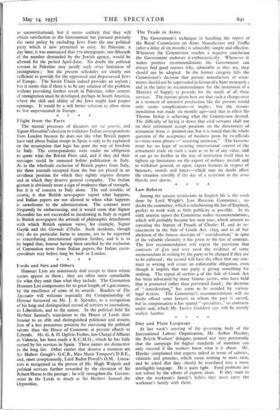The Trade in Arms The Government's technique in handling the
report of the Royal Commission on Arms Manufacture and Traffic (after a delay of six months) is admirably simple and effective. Whenever the Commission reaches a negative conclusion the Government endorses it enthusiastically. Whenever it makes positive recommendations the Government can always find good reasons why, admirable as they are, they should not be adopted. In the former category falls the Commission's decision that private manufacture of arma- ments should not be superseded in favour of a State monopoly ; and in the latter its recommendation for the institution of a Ministry of Supply to provide for the needs of all three services. The reasons given here are that such a change-over at a moment of intensive production like the present would only create complications—it might ; but the recom- mendation was made six months ago—and that in effect Sir Thomas Inskip is achieving what the Commission desired. The difficulty of laying it down that civil servants shall not on their retirement accept positions on the directorates of armament firms is pointed out, but it is stated that the whole question of the acceptance of business posts by ex-officials is—time-worn phrase—" receiving attention." The Govern- ment has no hope of securing international control of the armaments trade on such a scale as to be of any value, and it can go no further in the way of restriction itself than to tighten up limitations on the export of military aircraft and to withdraw general, or open, export licences in respect of bayonets, swords and lances—which may no doubt affect the situation sensibly if the day of a reversion to the anne blanche ever dawns.














































 Previous page
Previous page